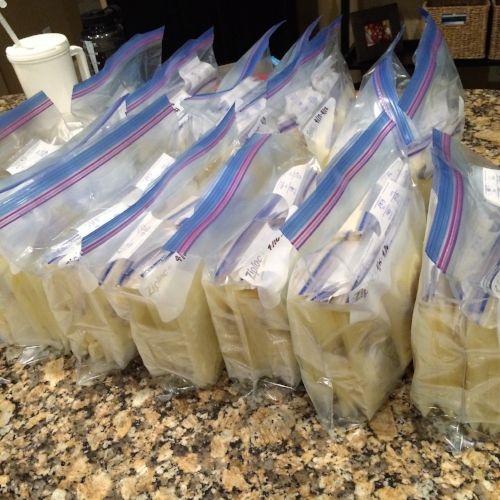August is National Breastfeeding Awareness Month and the final week of the month is Black Breastfeeding Week. Black Breastfeeding Week was created because of the gaping racial disparity in breastfeeding rates. The most recent CDC data show that 75% of white women have ever breastfed versus 58.9% of black women. The CDC also reports that increased breastfeeding among black women could decrease infant mortality rates by as much as 50%.
These stats and awareness movements are not meant to create a divide among mothers. All of us are doing the best we can. Each of our journey's is unique and valid and the most important thing is to feed our babies, however that may look. There are still gaps that exist though. Misinformation, lack of support, cultural barriers, and inequities in care all contribute to decreased rates of breastfeeding and unless we talk more openly about our struggles, then change and healing will never take place.
Today, I am honored to share with you the powerful words of my dear friend and fellow mama, Alicia Knight. Alicia's raw and open account of her breastfeeding journey was inspired during breastfeeding week a couple years ago. She felt left out and not represented as an exclusive pumping mama. She told me how she needed to get her story out of her brain so she too could feel that she belonged. She needed to say out loud that her way was valid and real.
Exclusive pumping mamas, your journey matters too.
by Alicia Knight
Sometimes breastfeeding looks like this. It's not nearly the bonding experience it is for some mothers. It doesn't involve significant amounts of skin to skin or late night feeding sessions nestled in the recliner in your baby’s room, just the two of you. It starts out with multiple lactation consultant visits assisting with positions, suggesting feeding your baby through a syringe - like a cat - to avoid nipple confusion. It’s waiting for your milk to come in, waiting 6 days to be exact, where is it?! It's being full of fear every time your baby starts crying for milk. Sometimes, it sounds like a lactation consultant telling you "if you feel that your baby is hungry, you need to feed your baby". It looks like your supportive husband standing in close distance during breastfeeding sessions, attempting not to hover, with a bottle of formula just waiting for you to say pop the lid and feed the baby as you sob at your inability to perform. It’s also coming to the realization that what you are doing is not working. The way you envisioned it may not work out. You may feel like a failure who can't do what you feel was intended of women. The significant bleeding, threat of infection, nipple shape and undetected lip and tongue ties are keeping you from getting there.
So you get the hospital grade pump and keep going for your baby. You refuse to give up, even if it's not what you expected. You continue to feel defeated every time he cries for milk and every time you hook up to that pump. The panic and uncertainty that take over are immense and overwhelming. But you keep doing it for him and you keep doing it for you. You pump around the clock, setting alarm after alarm, cleaning pump part after pump part, adding One. More. Schedule. into your already schedule filled life as the mother of a newborn. You spend spare time bagging milk and writing down the amount of breast milk he took and when. You still get engorged, leak through your clothes and wear breast pads but with little of the bonding that other mothers who feed their babies from their breasts may feel. You feed your baby less, because you are busy pumping while others have that chance.
But you keep going - keep cleaning, keep bagging, keep pumping for your baby. You pump in cars and locked closets, nursing rooms of fancy department stores and random dressing rooms sometimes while a screaming baby is sitting next to you waiting for milk. This is not what you intended, but this is your reality. It is not easy and you feel open, raw, and exposed every time you give your son a bottle of liquid gold. We only made it two weeks at the breast, but we made it 9 months of exclusively pumping and 13 months on my frozen breast milk. My overwhelming supply was kept in deep freezers at two locations. I fed my baby plus three other babies for months. I nourished in a way that I never imagined, in a different way, a better way for my family. We all do what we can to feed our babies, regardless of the source. Breast, bottled breast milk, donated breast milk, formula. But to my mamas, the exclusively pumping mamas out there, I see you. I see you struggling, unsure and feeling full of inadequacy and guilt for what your breastfeeding relationship could have been. I see you fighting this fight and doing what you feel is best for your baby. I see your love. Keep going, keep pumping, keep feeding - don't let anyone tell you your way is not the right way. Your way is right for you and that's all that matters.
Alicia is a Licensed Psychologist and Licensed Specialist in School Psychology with a Ph.D. in School Psychology. She lives in Houston, TX with her husband, and sons, 3.5 and 8 months old. Alicia spends her time helping students to access behavioral and mental health supports and services within the public school system. She survives on sticky kisses from both munchkins, book marathons with her oldest, and pounding the pavement in her Brooks whenever she can. Her dream job is to someday work at We Got Y’all mostly because she loves their mission but also because Issa Rae should be her BFF. Alicia loves binge watching anything with her husband after the kids are asleep – sometimes it takes 3 days to get through one episode but hey, mama is tired.




